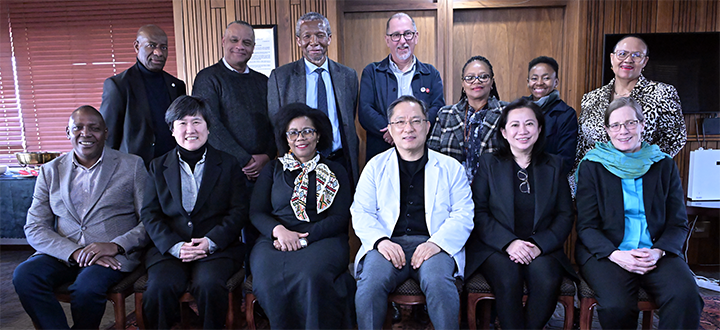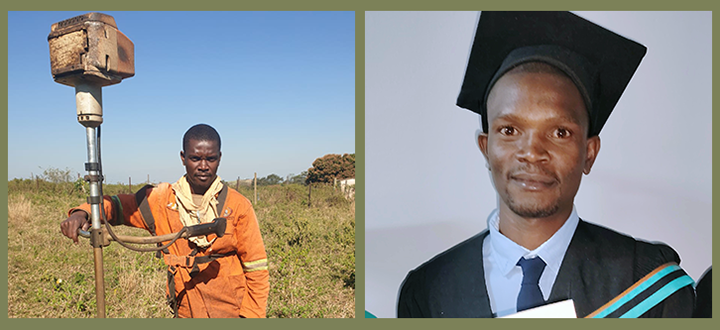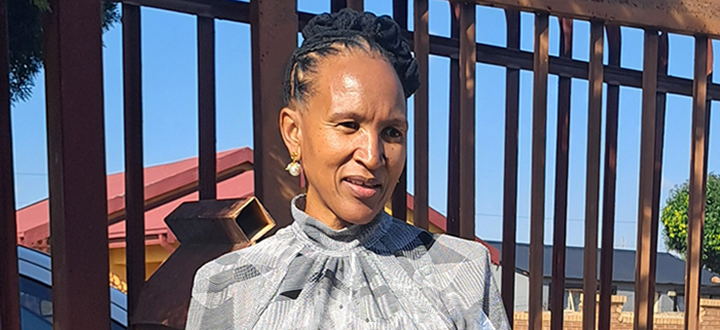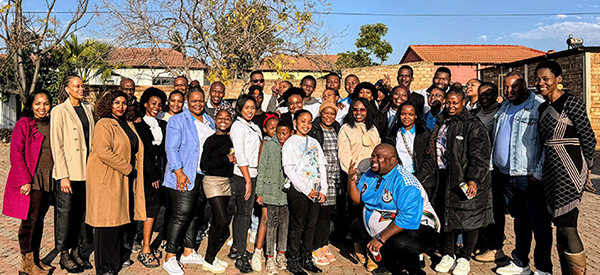College of Agriculture & Environmental Sciences
Celebrating World Food Day
 The College of Agriculture and Environmental Sciences, Department of Agriculture and Animal Health celebrated World Food Day on 26 October 2021, under the slogan “Our actions are our future. Better production, better nutrition, a better environment and better life.”
The College of Agriculture and Environmental Sciences, Department of Agriculture and Animal Health celebrated World Food Day on 26 October 2021, under the slogan “Our actions are our future. Better production, better nutrition, a better environment and better life.”
Ms Tryphine Zodwa Phakedi, the guest speaker at this event, thanked the department for inviting her to join them in their efforts to build knowledge and expand understanding about World Food Day, and its significance. Ms Phakedi serves a senior manager in the National Department of Agriculture, Land Reform and Rural Development. As a community developer, she is currently coaching SA Women Agripreneur in Agribusiness – a programme offered in collaboration with GIBS and the Embassy of France, as well as Corteva Agriscience. Ms Phakedi is also a registered doctoral candidate at the University of Fort Hare, with her thesis entitled: “Investigating the contribution of South Africa’s land reform programme in the livelihood of beneficiaries: Mpumalanga and Limpopo case studies.”
The theme of this year’s World Food Day issued a rallying call to every individual to help transform the agri-food system. To that end, more than 150 countries united to raise awareness of issues around poverty and hunger. As Ms. Phakedi noted, this year’s World Food Day found the world at a critical moment. Despite the difficulties caused by the Covid-19 pandemic, over the past year we, as humans, have witnessed the resilience and strength that are within each of us. Even before Covid-19, hundreds of millions of people worldwide were afflicted by hunger, with most recent estimates putting that number at a staggering 811 million. According to the 2020 Coronavirus Rapid Mobile (CRAM) survey, in South Africa, 47 per cent of adults surveyed, reported that their household ran out of money to buy food; 21 per cent reported someone in the household going hungry in the previous seven days, while 15 percent reported that a child went hungry in the previous week – that, despite this country producing sufficient food to feed everyone. Regrettably, 14 per cent of food is lost, and 17 per cent is wasted every year.
A real paradox exists in terms of access to food: on the one hand, more than three billion people worldwide do not have access to a nutritious diet, while on the other hand, almost two billion are overweight or obese due to a poor diet and a sedentary lifestyle. Since the state of global food security has significantly worsened of late, it is up to the international community to ensure that all nations follow through on the recommendations of the recent Food Systems Summit, by making use of the natural synergies of the United Nations’ (UN) system, and the competencies of the Rome-based UN agencies.
The way we produce, consume and waste food, is taking a heavy toll on our planet. It is putting unprecedented pressure on our natural resources, climate and environment, and costing us trillions of dollars each year. Importantly, the power to change is in our hands. “To build more fair and equitable food systems, we need to listen to the voices of small-scale producers and rural communities,” says Gilbert F. Houngbo, President of the International Fund for Agricultural Development (IFAD).
We need broad-based partnerships to ensure that small-scale farmers are fairly rewarded for their labour. Other priorities include establishing pricing systems that reflect the full and true cost of production, and deploying more finance to neglected and vulnerable rural communities. The transformation of the agri-food system must start with ordinary consumers, and the daily choices we all make about the foods we consume, where we buy them, how they are packaged, how much we throw away – all these aspects affect the future of our planet.
Challenges facing farmers in South Africa
The challenges facing local farmers, include the following:
- Rising input costs
- A dependence on external factors beyond their control (e.g., the oil price and exchange rate)
- Finite natural resources (looming water scarcity, increasing loss of soil)
- Negative, long-term changes in the climate
- A decline in the health and functioning of supporting and underpinning natural systems
- A lack of subsidies and extension support for both established commercial farmers and emerging/developing black farmers
- Limited market predictability, and nontariff trade barriers in importing countries
- Increasing competition from cheap, subsidised imports.
How to make an impact on agri-food systems
The implementation of the UN’s sustainable development goals (SDGs) is helping the world work towards the objectives of better production, better nutrition, a better environment and a better life, underpinned by a new ten-year strategic framework which defines several concrete inputs.
- Implementation of high-impact projects: According to the estimates of the Food and Agriculture Organization (FAO), up to $40–50 billion in annual investments on targeted interventions is needed, to end hunger by 2030. In that regard, many low-cost, high-impact projects can help hundreds of millions of people to better meet their food needs.
- Implementation of targeted research and development: Along with digital innovation, farming can be made more technologically advanced. Improved literacy rates among women can also significantly help to reduce hunger.
- Implementation of the FAO’s Hand-in-hand initiative: Among the FAO’s flagship programmes is this initiative, aimed at boosting rural transformation, urban food systems, and resilient agri-food systems, by scaling up investments. Currently, 34 countries have joined the programme, which seeks to match suitable partners with efforts targeting the world’s poor.
- Transforming rural communities: Rural transformation involves a process of comprehensive societal change, whereby those societies diversify their economies and reduce their reliance on agriculture; become dependent on distant places to trade and acquire goods, services, and ideas; and move their goods from dispersed villages to towns.
- Preserving biodiversity: This is an extraordinary challenge that must be met by greater understanding of biodiversity itself, changes in human behaviour and beliefs, and various preservation strategies. Transforming ecologies involves seeing ecology as related to the social use of space and cities. “Green”, urban communities and food systems need to be planned and managed together with the green environment, to curb pollution, encourage healthy eating habits, and promote physical activity.
As countries develop, people spend a smaller share of their income on food, and more of it on nutrient-rich, processed, and convenient foods. This transformation is made possible as farmers become more productive; employment in agriculture declines; while new jobs are created off the farm, in the food industry and services, to cater to changing customer demands. The expansion of off-farm, agri-food jobs partly compensates for the loss of on-farm work that is generated in towns close to poor populations. Off-farm jobs are proving to be an important factor in helping to reduce poverty.
Publish date: 2021-11-23 00:00:00.0


 Unisa wins bid to host IAMS General Assembly
Unisa wins bid to host IAMS General Assembly
 Cutting grass by day, pursuing Unisa studies by night
Cutting grass by day, pursuing Unisa studies by night
 Unisan’s research set to improve accident records management through AI
Unisan’s research set to improve accident records management through AI
 Koma e wetse: When tradition meets the harsh realities of modern livelihoods
Koma e wetse: When tradition meets the harsh realities of modern livelihoods
 Imbizo inspires youth
Imbizo inspires youth